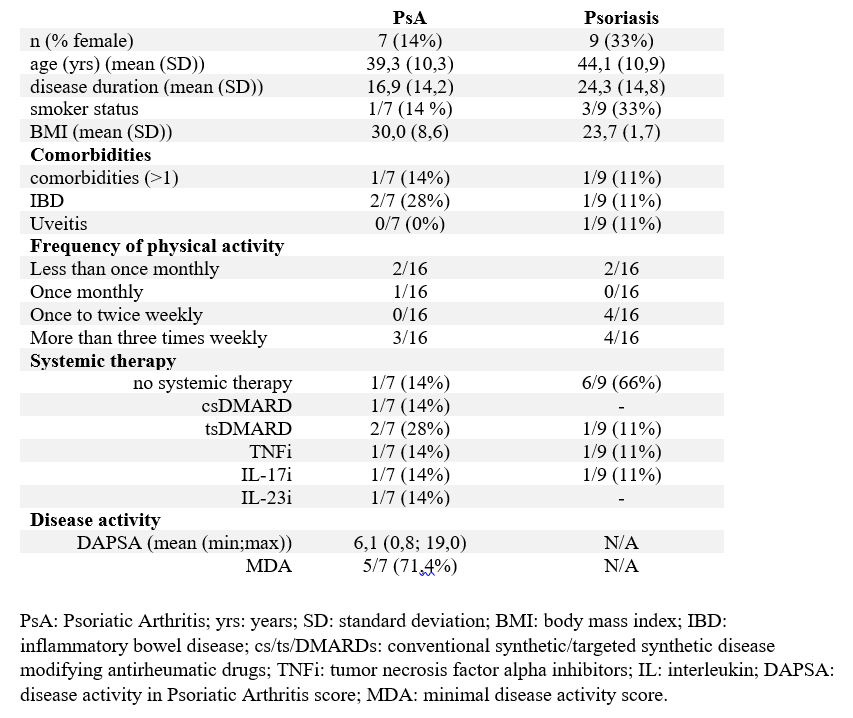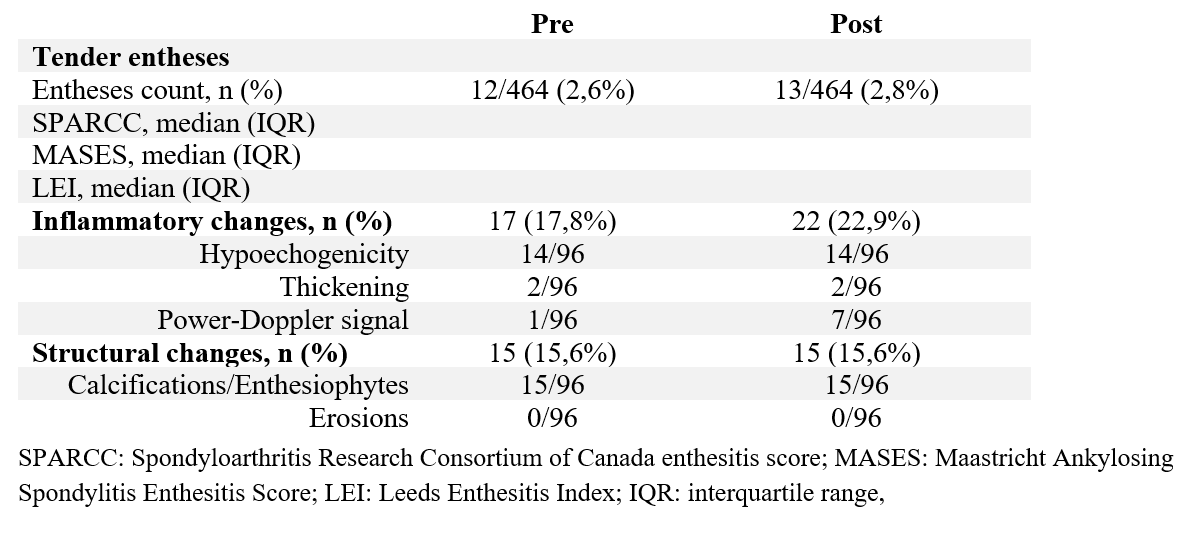Session Information
Session Type: Poster Session A
Session Time: 9:00AM-11:00AM
Background/Purpose: International guidelines advise physical activity as complementary measure to drug treatment for patients with RA. However, this can hardly be extrapolated for PsA, for which excessive physical strain areas has been implicated in the pathogenesis of enthesitis (so-called “Deep Koebner phenomenon”). This raises the question whether physical activity should be at all recommended in PsA, and if yes what type of activity and intensity are safe. Hence, determining safe thresholds for exercise in PsA is of high importance. In this context, we aimed to assess the effects of mechanical strain on the entheses of psoriatic patients exposed to low-moderate physical activity through badminton, which exerts considerable mechanical stress on the extremities.
Methods: A prospective study was conducted on a cohort of patients with PsA fulfilling CASPAR criteria and PsO recruited at the department of rheumatology of the Erlangen University Clinic and of the Nürnberg Hospital. Participants underwent physical examination of 29 entheses and US of the entheses at the lateral humeral epicondyle, inferior patellar pole, and Achilles tendon bilaterally before and after a 60-minutes badminton session through two rheumatologists (AH, AK). Two blinded expert readers scored US scans to assess entheseal pathology according to OMERACT criteria (MYM, FF). Data on clinical history, therapy, physical activity habits, disease activity, and pain before and after exercise were collected. A follow-up assessment of pain and adverse events was performed one week afterwards by telephone.
Results: Seven patients with PsA and 9 PsO patients were included. A total of 196 grayscale and power Doppler (PD) US scans were acquired. Baseline clinical characteristics are reported in Table 1. After training, no significant change in median VAS pain nor in tender entheses emerged (Table 2). Baseline US showed structural and inflammatory changes in 15/96 and 17/96 entheses, respectively. After training, 4 patients (2 PsA, 2 PsO) developed a grade-1 Power-Doppler at 6 entheses (Figure 1), which remained non-tender. After one week, median VAS pain remained stable (0,5 cm (0,0-3,0)). Only one untreated PsA participant with active disease at baseline experienced new-onset arthritis in three joints. A single adverse event (disc protrusion) was reported by one PsO patient.
Conclusion: Our findings show that low-moderate mechanical strain on entheses, as in the context of leisure physical activity, is likely to be well tolerated by patients with psoriasis and PsA and might not lead to an increase in disease activity. As the only flare in our cohort was observed in an untreated PsA patient, immunomodulatory therapy could possibly offer some protection against mechanically-induced inflammation. Larger controlled studies are needed to validate our findings and define which physical activity thresholds are safe in PsA. Generating this data is crucial to inform management decisions and ultimately develop evidence-based guidelines for physical activity in PsA.
To cite this abstract in AMA style:
Fagni F, Yalcin Mutlu M, Minopoulou I, Temiz S, Krieter M, Schett G, Kleyer A, Simon D, Hueber A. Effects and Tolerability of Low to Moderate Biomechanical Stress During Leisure Sport Activity in Patients with Psoriasis and Psoriatic Arthritis [abstract]. Arthritis Rheumatol. 2023; 75 (suppl 9). https://acrabstracts.org/abstract/effects-and-tolerability-of-low-to-moderate-biomechanical-stress-during-leisure-sport-activity-in-patients-with-psoriasis-and-psoriatic-arthritis/. Accessed .« Back to ACR Convergence 2023
ACR Meeting Abstracts - https://acrabstracts.org/abstract/effects-and-tolerability-of-low-to-moderate-biomechanical-stress-during-leisure-sport-activity-in-patients-with-psoriasis-and-psoriatic-arthritis/



